Aboriginal and Visible Minority
Librarians
Aboriginal and Visible Minority
Librarians
Oral Histories from Canada
Edited by
Deborah Lee
Mahalakshmi Kumaran
ROWMAN & LITTLEFIELD
Lanham Boulder New York Toronto Plymouth, UK
Published by Rowman & Littlefield
4501 Forbes Boulevard, Suite 200, Lanham, Maryland 20706
www.rowman.com
10 Thornbury Road, Plymouth PL6 7PP, United Kingdom
Copyright 2014 by Rowman & Littlefield
All rights reserved. No part of this book may be reproduced in any form or by any electronic or mechanical means, including information storage and retrieval systems, without written permission from the publisher, except by a reviewer who may quote passages in a review.
British Library Cataloguing in Publication Information Available
Library of Congress Cataloging-in-Publication Data
Aboriginal and visible minority librarians : oral histories from Canada / edited by Deborah Lee, Mahalakshmi Kumaran.
pages cm
Includes bibliographical references and index.
ISBN 978-1-4422-3681-3 (pbk.) ISBN 978-1-4422-3682-0 (ebook)
1. Minority librariansCanadaBiography. 2. Minority librariansEmploymentCanada. 3. Minorities in library scienceCanada. 4. Indigenous peoplesEmploymentCanada. I. Lee, Deborah, 1954 editor of compilation. II. Kumaran, Maha, editor of compilation.
Z720.A46C22 2014
020.92'271dc23
2014008851
 TM The paper used in this publication meets the minimum requirements of American National Standard for Information Sciences Permanence of Paper for Printed Library Materials, ANSI/NISO Z39.48-1992.
TM The paper used in this publication meets the minimum requirements of American National Standard for Information Sciences Permanence of Paper for Printed Library Materials, ANSI/NISO Z39.48-1992.
Printed in the United States of America
Preface
Lotsee Patterson
Written from an Aboriginal and visible minority librarian perspective, this work represents a substantial contribution to understanding for the non-Native community of librarians. Offering introspective insight into their experiences as librarians whose own cultures and traditions may differ from those of the majority populations in which they often serve, the authors address their personal and professional challenges.
The first of its kind featuring Canadian library professionals, this book serves as a primer for strengthening diversity in library environments. The benefits of having librarians of color, of embracing varying cultures, and of accepting diversity of thought and custom can be garnered from the oral histories contained in the text that follows. Those who are fortunate enough to have worked in a culturally diverse environment will testify they are richer for the experience. Those who have not can benefit from reading the inspirational narratives of the eighteen distinguished contributors contained in this volume.
In the text, contributors write from their individual perspectives where successes are celebrated, challenges are faced and surmounted, and all share a commitment both to the profession and to minority groups in their oral histories. A few found mentors who guided them; others relied on networking with one another as their primary means of moral and professional support. All embrace their cultural identities and are encouraging about the future for Aboriginal and visible minority peoples who may enter the world of libraries, archives, museums, and the larger sphere of knowledge management.
Unknown opportunities await those who enter the expanding field of librarianship, Indigenous knowledge management, and cultural preservation. For those who follow in the footsteps of this band of trailblazing visible minority and Aboriginal librarians whose stories are presented here, this volume will serve as a foundation upon which to build.
Lotsee Patterson, PhD, Professor Emerita, University of Oklahoma
Introduction
Deborah Lee and Maha Kumaran
How much do you know about librarians of color in your organization? Are there any librarians with Aboriginal or visible minority heritage at your library? Have you ever had open conversations with librarians of non-Caucasian backgrounds to learn and understand the challenges and/or concerns they may have? If you have never had a chance to sit down and talk to visible minority and Aboriginal librarians about their experiences in libraries, this is a book for you. Whether you are a librarian, manager, supervisor, director, or dean in your library or a faculty member in a library school, or whether you are just interested in race relations, this book will shed light on the issues that these librarians have silently faced and overcome in their professional lives. The contributors to this book not only share their experiences but also offer tips to other librarians like themselves.
In spring 2012, we, the editors, discussed the idea of gathering chapters from Canadian visible minority and Aboriginal librarians to publish a book on their experiences working in Canadian libraries. Other such books had inspired us, but they were from the perspective of people of color and work environments in the United States (see, for example, Webster [2005], Neely & Abif [1996], and Roy, Bhasin & Arriaga [2011]). We had both previously published but wanted to provide a voice to other librarians of color and to hear their thoughts on working in Canadian libraries, their experiences, their challenges, how they overcame those challenges, and what they contributed to their profession. Several eager librarians responded that they would like to participate. A couple of visible minority librarians who were from outside of North America wanted to know if they could participate.
To start the process, we asked for abstracts from interested librarians, as a way for them to make a commitment to the project. Almost all were asked to continue writing their chapters. The editors served as first reviewers of various iterations of the chapters before they were sent on to peer reviewers. We are tremendously grateful to our reviewers, who provided wonderful insight into how the authors could improve on their chapters, improvements that had been missed by the editors. We found that it really helped to have another pair of eyes take a look at the chapters and provide useful feedback. Eighteen chapters, including one each from the editors, were finalized by October 2013; these are the stories that we are proud to share with you.
We are pleased to have found amazing similarities between the stories told by Aboriginal and visible minority librarians. Both groups of librarians speak of their connections to their individual communities, whether they are, for instance, of Filipino, Cree, Mtis, Indian, or Jamaican ancestry. Erie Maestro mentions her connection to the Filipino community and her contributions to it. She also speaks of the respectful behavior of Filipino children in her library. In most non-Caucasian cultures, children do not refer to adults by their names; they use terms such as auntie or sister. Informal adoptions of youth happen often in these communities where the adult (librarian or not) takes care of the younger child and their needs. Given the collectivist nature of Aboriginal and visible minority cultures, the adage it takes a village to raise a child is true in both of these communities. Suzy Bear, speaking from the academic library world, notes that whenever she sees former students in the community, she asks if they have finished their postsecondary education and, if not, as a true auntie, asks them when they are going back to finish. For both Aboriginals and visible minorities, meeting the community wherever we are is essential. Despite our minority status and having to make it in the mainstream world, it is vitally important for us to keep our community connections.
Next page
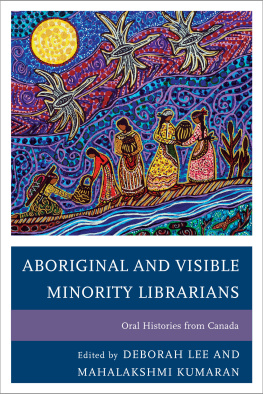
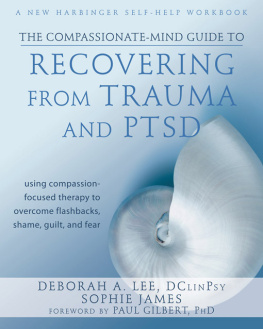
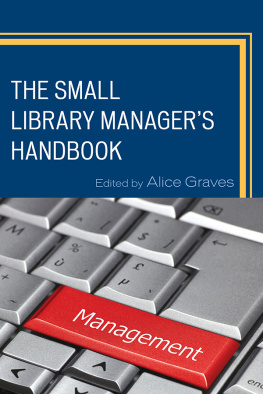
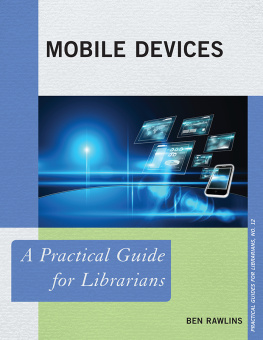

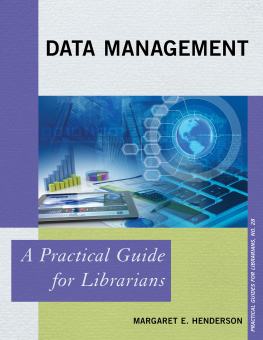
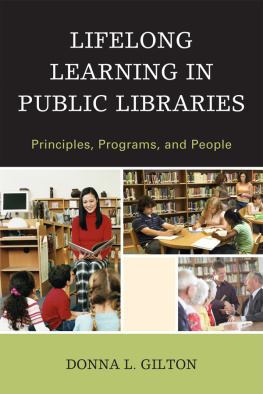

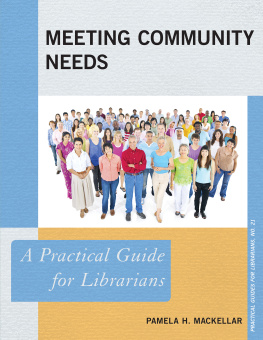
 TM The paper used in this publication meets the minimum requirements of American National Standard for Information Sciences Permanence of Paper for Printed Library Materials, ANSI/NISO Z39.48-1992.
TM The paper used in this publication meets the minimum requirements of American National Standard for Information Sciences Permanence of Paper for Printed Library Materials, ANSI/NISO Z39.48-1992.